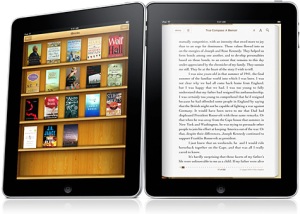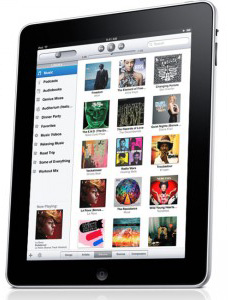Major Publishers Being Sued Over the Agency Model
The United States Department of Justice is suing Apple along with publishers Hachette SA, HarperCollins, Macmillan, Penguin, and Simon & Schuster, for conspiring to raise the prices of ebooks. This article at PC World does a pretty good job of explaining the basics of the situation. Here’s the core of it:
At issue is Apple’s use of the “agency” model of e-book pricing, which lets publishers set their own prices. Apple takes a 30 percent cut of sales, but requires that e-books are sold for no cheaper elsewhere. That approach came into conflict with the “wholesale” model used by Amazon, where the bookseller pays roughly half the recommended cover price, then sets its own pricing.
With the wholesale model, Amazon could offer cut-rate prices on e-books — often $10 for bestsellers — in order to build up its Kindle service. When Apple launched the iPad in 2010, publishers flocked to the agency model, fearing that the wholesale model would lead to a race to the bottom in pricing. Amazon was forced to adopt the agency model, and today, a $10 bestseller is much harder to find. New books tend to sell for around $13 to $15 instead.
Apple and publishers may argue that the agency model leveled the playing field for booksellers, forcing them to compete on hardware and software features instead of pricing. And as Bloomberg points out, e-book sales rose 117 percent in 2011, so it’s hard to argue that higher prices ruined the digital book industry. source
 Opinions on this could go either way, but if there really was a conspiracy by the big publishers to raise prices, that would be against the law. This is a big enough story that they even talked about it on the Nightly News with Brian Williams tonight. From my position as someone who works in this industry, it’s all kind of surreal because for the longest time ebooks were overlooked and not taken seriously. Now they’ve become popular and mainstream enough that there are serious legal issues being considered. I also know that the agency model created major headaches for independent ebook sellers, so for that reason it would be kind of nice if it was deemed illegal. However, I can also understand that from a publisher’s point of view, Amazon’s price cutting is very scary for them.
Opinions on this could go either way, but if there really was a conspiracy by the big publishers to raise prices, that would be against the law. This is a big enough story that they even talked about it on the Nightly News with Brian Williams tonight. From my position as someone who works in this industry, it’s all kind of surreal because for the longest time ebooks were overlooked and not taken seriously. Now they’ve become popular and mainstream enough that there are serious legal issues being considered. I also know that the agency model created major headaches for independent ebook sellers, so for that reason it would be kind of nice if it was deemed illegal. However, I can also understand that from a publisher’s point of view, Amazon’s price cutting is very scary for them.
I wonder what actually happened. I remember that Amazon offered most Kindle ebooks for $9.99 in the beginning, and that suddenly stopped once Apple started requiring that publishers couldn’t sell their ebooks for a lower price than the price they set for iBooks downloads. But was that the only thing? Was it solely Apple’s decision, or was there some kind of secret meeting between publishing executives where they sat in a dark room around a table and agreed to raise ebook prices? The truth is probably something in between. It’ll be very interesting to see what comes of this and how it affects ebook prices and publishing in the future.
Steve Jobs
I am very sad today about the news of Steve Jobs‘ passing. He was truly a driving force behind the technology that surrounds us in our daily lives, and the world would have developed into a significantly different place without him. He is someone who will be remembered for centuries.
Sony Threatens to Pull Music from iTunes
This isn’t directly related to ebook software, but it is a followup to my recent post about Sony’s issues with Apple. As you’ll remember, Apple rejected Sony’s eBook App because it does not allow users to purchase ebooks through Apple (which would give Apple 30% of each sale).
Now, it seems that Sony is threatening to pull all of their music from iTunes.
“SONY has signalled it may withdraw its artists from Apple’s iTunes store and withhold its games from the iPhone in a sign the two companies are on the brink of all-out war.”
Sony plans to offer their music in their own system called Music Unlimited instead, which is already available in Europe and will be available in Australia soon. This is significant because Sony is the world’s second-largest record company, representing a large amount of artists, including Madonna, Michael Jackson, and Bob Dylan. If all of Sony’s artists were pulled from iTunes, Apple’s music market would be a very different place.
“The new Sony music service, which opened in Europe last year, will have a library of 6 million tracks and users will be able to stream songs to Sony TVs, PlayStation3 consoles, PSP portable game players and Blu-Ray players.”
Michael Ephraim from Sony was quoted as saying, “Publishers are being held to ransom by Apple and they are looking for other delivery systems, and we are waiting to see what the next three to five years will hold.”
No matter which side you take, this may end up being quite important in the history of online digital content delivery. As far as ebooks go — we are sure to see much of the market go to Android devices in the upcoming few years, and that will already be outside of Apple’s control. Apple may be left with their usual small fanbase for customers, while everyone else uses the more inexpensive options provided by Sony, Google, and Microsoft.
Apple Wants Their eBook Money
My RSS feeds are all abuzz today about how Apple has denied Sony’s app for the Sony Reader. It seems that Apple decided they didn’t like it because users could buy content through the app, and Apple would not get a share of the profit. This kind of blows me away because, as far as I can tell, other similar ebook apps like the Kindle and Nook apps have been doing this all along, and apparently it didn’t become a problem until Sony submitted their app.
I guess it was the straw the broke the camel’s back for them. Too many companies all trying to sell ebooks without giving Apple money for each sale, and they decided to suddenly change the rules on everyone.
Read more about this on Wired. Quotes:
Apple has responded to the furor over its supposed App Store policy changes that many believe could affect the popular Kindle, Nook and Sony Reader apps. The company claims it has not changed any of its guidelines given to developers, but it indirectly confirms that accessing content purchased elsewhere could be a no-no if that content isn’t also available to be purchased through Apple’s own system.
…
Apple also allegedly told Sony that the app couldn’t access content purchased on other Sony Reader devices, which is where most of the outrage was focused. Amazon’s Kindle app and Barnes & Noble’s Nook app are both popular mechanisms for users to download and read books that they have purchased from the respective stores. Many feared that this supposed change in Apple policy would take their e-books away from their iPads, iPhones and iPod touches.
Apple’s second statement indicates that this is indeed the case — sort of. If an app lets users access content that they purchased via Amazon’s website, for example, then that same app must also let users buy the same book via Apple’s own in-app purchase system. If the app developer doesn’t want to use Apple’s in-app purchases to sell content, then the app can’t access content purchased elsewhere either.
It seems that Amazon and Barnes & Noble will have to rework their ebook apps so that users will somehow buy the content through Apple, so that Apple gets the 30% that they charge for content purchased through iTunes. Eh … I’m not even going to try and rewrite the details. Check out the article in Wired, linked to above. I’m sure we’ll be hearing more about this soon.
Top 5 eBook Reading Apps for iPad and iPhone
 I’ve been working on my series of articles/blog posts for “The Top 5 Reasons Why Your eBook Isn’t Opening”. Three of them have been posted here so far. Don’t worry, that series will be continued with the next installment soon. But to take a break from it, I’ve made a new Squidoo lens that is also in the theme of “top 5” things: Top 5 eBook Reading Apps for iPad and iPhone.
I’ve been working on my series of articles/blog posts for “The Top 5 Reasons Why Your eBook Isn’t Opening”. Three of them have been posted here so far. Don’t worry, that series will be continued with the next installment soon. But to take a break from it, I’ve made a new Squidoo lens that is also in the theme of “top 5” things: Top 5 eBook Reading Apps for iPad and iPhone.
I know that many people love using their iPads as ebook readers. It makes a lot of sense because if you have an iPad there is no need to buy a separate ebook reader, and it does so much else at the same time. I’m not ready to spend the $500 that an iPad costs, but if I had an iPad, I would definitely make use of it as an ebook reader. I like the fact that it has a backlit screen instead of an e-ink screen like dedicated ebook reading devices (but that’s a matter of personal preference).
The lens I created today outlines the most popular ebook reading apps that you can use on your iPad and iPhone. You actually have a lot of flexibility when it comes to where you get your ebooks, so if you’re not familiar with the options, go check it out.

